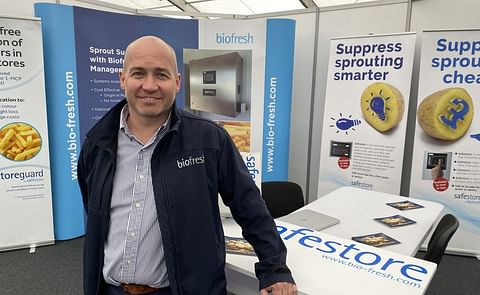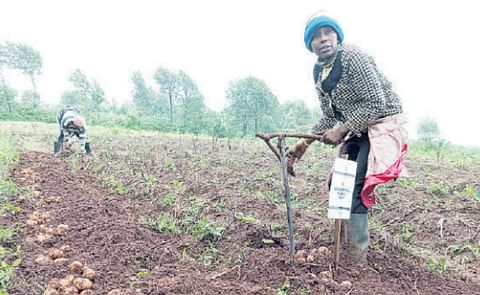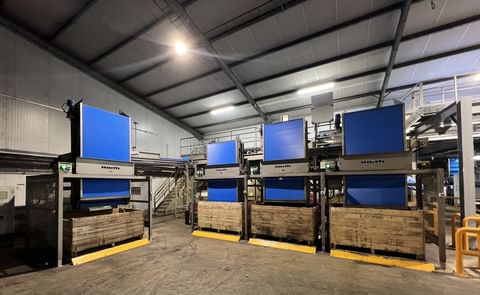George Kinuthia (left) checks the progress of the potato harvesting at his farm in Molo with Fergus Robley (right) the Managing Director of FMD East Africa and Jan Soltau (centre) the Sales Manager of Grimme.
Potato Farmers in Kenya turn to mechanization to meet rapidly increasing demand

The fast expansion of cities and towns and the popularity of fast foods have created a rapidly increasing demand for potatoes in Kenya. Farmers are turning to mechanization to meet this demand by improving cultivation and reducing harvest losses which can amount to up to 50 per cent of the crop.
According to Fergus Robley, the General Manager of FMD East Africa, mechanization of potato farming can help Kenyan farmers produce up to five times what they produce today. This would improve the livelihood of the farmers, help the country achieve food security and reduce reliance on maize.
Fergus Robley, General Manager of FMD East Africa:
The planter allows the seeds to be placed at the right depth and given intervals as specified by the seed producers. This precision planting ensures that the correct plant population is attained therefore maximizing the harvest. This Implement also ensures the bed is reformed correctly to give good seed soil contact and coverage which all helps towards maximum multiplication of the tubers.
During the growing process, the tubers must not be exposed to light and the weeds should be controlled in order to give the potatoes a "competitive advantage”. The soil beds also get eroded by rain and wind. The seed bed maintainer (hilling ridger) earths up mounds of soil from between the rows and prevents these detrimental yield limiting factors from happening. This operation is usually carried out around 3 times between planting and harvesting.
The greatest loss of crop is experienced during harvesting. In Kenya up to 60 per cent of the crop can be damaged when the process is done manually. The potato harvester reduces this loss to near zero because it runs at a certain depth just below the crop picking the potatoes and soil onto specially coated rollers and chains. The chains then let through the soil between the gaps leaving whole undamaged potatoes on the soil surface ready to be weather hardened and bagged. This creates a nice flat seed bed for the farmer to plant another crop into without the need for any further mechanical land preparation.
To prevent the build-up of pathogens in the soil, farmers should avoid growing potatoes on the same land from year to year. Instead, they ought to grow potato in rotations of three years alternating with other dissimilar crops, such as maize and beans. Crops susceptible to the same pathogens as potatoes like tomatoes should be avoided in order to break the potato pests' development cycle.
Fergus Robley added that mechanization has to go hand in hand with training of farmers especially on the right handling and maintenance of machinery.
Fergus Robley:
According to Fergus Robley, the General Manager of FMD East Africa, mechanization of potato farming can help Kenyan farmers produce up to five times what they produce today. This would improve the livelihood of the farmers, help the country achieve food security and reduce reliance on maize.
Fergus Robley, General Manager of FMD East Africa:
“The average potato yield in Kenya is three to six tonnes per acre. Several factors contribute to this dismal performance including substandard potato seeds, low level of mechanization and poor application and quality of fertilizers.”Good land preparation is paramount in potato farming. The soil needs to be conditioned and free of weeds. The seed bed former, also known as the rotary ridger prepares the soil by mechanical means to give bed a consistent tilth and good aeration. This is necessary to ensure the tubers are able to multiply sideways.
“Potato output can be increased to 20 to 30 tonnes per acre by addressing these factors. The selection of the seed potato is very important, but in Kenya it is given little attention. Our farmers usually sell the largest potatoes for cash, eat the medium-sized ones at home, and keep the smallest as future planting material. Poor seed delivers a poor harvest.”
“Mechanization is the surest way of improving yield. Farmers who have embraced mechanized agriculture and use high quality seeds as well as appropriate fertilizers are assured of increased production. They are also guaranteed lower production costs giving higher profits.”
“Individual small farmers can benefit from mechanization by using the services of agricultural contractors, or joining together to purchase equipment for common use. FMD East Africa offers a range of potato farming implements that include a seed bed former, planter, seed bed maintainer and the potato lifter, or harvester. For mechanization to produce the desired results, these four implements have to work together.”
The planter allows the seeds to be placed at the right depth and given intervals as specified by the seed producers. This precision planting ensures that the correct plant population is attained therefore maximizing the harvest. This Implement also ensures the bed is reformed correctly to give good seed soil contact and coverage which all helps towards maximum multiplication of the tubers.
During the growing process, the tubers must not be exposed to light and the weeds should be controlled in order to give the potatoes a "competitive advantage”. The soil beds also get eroded by rain and wind. The seed bed maintainer (hilling ridger) earths up mounds of soil from between the rows and prevents these detrimental yield limiting factors from happening. This operation is usually carried out around 3 times between planting and harvesting.
The greatest loss of crop is experienced during harvesting. In Kenya up to 60 per cent of the crop can be damaged when the process is done manually. The potato harvester reduces this loss to near zero because it runs at a certain depth just below the crop picking the potatoes and soil onto specially coated rollers and chains. The chains then let through the soil between the gaps leaving whole undamaged potatoes on the soil surface ready to be weather hardened and bagged. This creates a nice flat seed bed for the farmer to plant another crop into without the need for any further mechanical land preparation.
To prevent the build-up of pathogens in the soil, farmers should avoid growing potatoes on the same land from year to year. Instead, they ought to grow potato in rotations of three years alternating with other dissimilar crops, such as maize and beans. Crops susceptible to the same pathogens as potatoes like tomatoes should be avoided in order to break the potato pests' development cycle.
Fergus Robley added that mechanization has to go hand in hand with training of farmers especially on the right handling and maintenance of machinery.
Fergus Robley:
“FMD East Africa does this by delivering each piece of equipment to the farmer and training the operator. We also hold clinics every month in various parts of the country where we carry out free inspection of Massey Ferguson tractors and carry out demonstrations such as calibration of implements. We also guide farmers about embracing good farming practices so the correct and economical land preparation is done for healthy crops.”
Like to receive news like this by email? Join and Subscribe!
NEW! Join Our BlueSky Channel for regular updates!
精选企业
Sponsored Content
Sponsored Content
Sponsored Content
Sponsored Content
Sponsored Content








